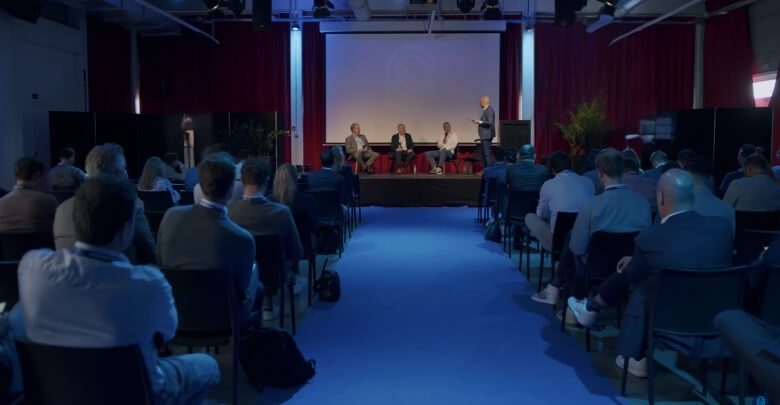Taking part in a conference provides insights from industry experts, an opportunity to expand your knowledge, and a chance to connect with industry professionals. However, the large number of sessions can be confusing, leading to the question, “How do I choose which sessions to attend at a conference?”
You can choose conference sessions effectively by defining your goals first. Research speakers, consider session formats, balance quality and quantity, and stay flexible. Prioritize sessions that are aligned with your objectives for the best conference experience.
Follow the rest of the article for detailed strategies and tips to help you make the best choices at your next conference.
Conference Attendees: What Do You Need to Know?
Taking part in a conference can be a valuable experience for both personal and professional development. Prepare in advance to make the most of this opportunity. Start by reviewing the conference agenda and selecting sessions that align with your interests and goals. Knowing what to expect can help you stay focused and engaged throughout the event.

Networking is another crucial aspect of conference attendance. Meeting new people in your field can open doors to future collaborations and career advancements. Be sure to bring business cards and be ready to introduce yourself. Engaging in conversations can lead to meaningful connections beyond the conference itself.
You should also reflect on your reasons for attending. Having a clear idea of your motivation for attending a conference can guide your actions and choices during the event. Whatever your goal may be, clarity in your purpose will improve your experience and make it more rewarding.
How Do I Choose Which Sessions to Attend at a Conference?
Choosing the right sessions at a conference can greatly enhance your experience and ensure you get the most out of the event. To make informed and impactful decisions, you must understand how to approach this selection process.
Step 1: Define Your Goals
Make sure you define your goals before selecting which sessions to attend. You should have clear goals, whether they’re to gain new knowledge, expand your network, or stay updated with industry trends. This clarity ensures that every session you choose supports your overall objectives so your conference experience is more enjoyable and rewarding.
Step 2: Research the Speakers
Invest time in researching the conference’s speakers. You can determine which sessions will be most beneficial for you if you know the speakers’ backgrounds, expertise, and previous work. Knowing who the speakers are will help you prepare questions and make connections aligned with your professional goals. This step is key to ensuring that the sessions you attend are informative and impactful.
Step 3: Consider Session Formats
Different session formats offer various learning experiences. For example, workshops provide hands-on, practical learning, while panels offer multiple perspectives on a topic. Keynotes usually give broad, industry-wide insights. When choosing sessions to attend at a conference, consider which formats align best with your learning style and goals. Choosing the right formats will help you stay engaged.
Step 4: Balance Quality and Quantity
Attending too many sessions can lead to burnout, which makes it difficult to retain information. Instead, choose sessions that align with your goals to ensure that you absorb valuable insights without feeling pressured. By balancing quality with quantity, you can leave the conference with meaningful takeaways.
Step 5: Stay Flexible
When attending a conference, flexibility is important. Make sure you’re open to changing your plans based on unexpected opportunities, such as impromptu networking. Being flexible allows you to adapt your schedule to take advantage of these opportunities, ensuring you don’t miss out on anything that could enhance your experience. Flexibility ensures you can maximize the benefits of the event.
Step 6: Prioritize Aligned Sessions
Select sessions that support your goals once you define what you want to achieve. You may need to develop new skills or focus on topics that are crucial to your current projects. Investing time at the conference in aligned sessions will ensure your professional and personal growth. This focused approach enhances the overall value you gain from attending.
Making the right choices at a conference can significantly improve your experience. By being thoughtful in your planning and staying open to opportunities, you can ensure that your time at the event is both productive and rewarding.
Is It Beneficial to Attend Sessions Based on the Session Format?
Yes, choosing sessions based on their format can influence your conference experience. For a more fulfilling experience, understanding how different formats work and considering your learning style can help you decide which sessions to attend.
Formatting Sessions
Different formats offer varied benefits. Panels typically feature multiple speakers discussing a topic, providing a range of perspectives. Workshops are interactive, allowing participants to engage in hands-on activities. Keynotes are usually delivered by experts, offering high-level insights into industry trends.
Matching Learning Styles
Identify your preferred learning style and choose session formats that match it. For visual learners, presentations with strong visuals can be beneficial, while interactive workshops are best for hands-on learners. Those who learn best by listening might prefer keynotes and panel discussions. Many international conferences bring together diverse formats to cater to different learning styles. Global events like international conference in Canada, for example offer a mix of these formats, allowing participants to engage in ways that suit their learning style and enhance their overall experience.
Engagement Level
Consider how engaged you want to be during the sessions. Workshops require active participation, ideal for those who enjoy interactive learning. Panels allow for moderate engagement, with opportunities for Q&A. Keynotes are less interactive but provide deep insights from experts.
Balancing the Schedule
Aim for a mix of session formats to balance your conference experience. Too many workshops might be exhausting, while only attending keynotes could be less engaging. Combining various formats keeps the experience dynamic. This approach ensures you stay energized and gain diverse insights.
Choosing the right session format can greatly influence your conference experience. By understanding your learning style and balancing different formats, you can stay engaged and maximize the event’s opportunities and insights.
Importance of Networking During Sessions
A crucial aspect of attending conferences is networking. It provides opportunities to connect with professionals, share knowledge, and build relationships that benefit your career. Here’s why networking during sessions is so important:
- Improves Learning Experience: Engaging with others during sessions can deepen your understanding of the material. Discussing concepts with peers allows you to see different perspectives.
- Builds Professional Relationships: Meeting new people expands your professional network. These connections can lead to future collaborations and job opportunities.
- Increases Visibility: Actively participating in discussions makes you more visible to others. This visibility can open doors to new professional opportunities and recognition in your field.
- Access to New Perspectives: Conversations with fellow attendees often reveal information you might have missed. Learning from others’ experiences can provide valuable tips and strategies.
- Boosts Confidence: Networking helps improve your communication skills. Regular interactions with peers boost your confidence in professional settings.
- Establishes long-term relationships: The relationships you build can last beyond the conference. These long-term connections can provide ongoing support and mentorship throughout your career.
Networking at conferences plays a key role in professional growth. Connecting with others improves your learning, builds valuable relationships, and increases your visibility. Don’t miss these opportunities to make the most of your conference experience.
Tips for Maximizing Your Conference Experience
Attending a conference can be a rewarding experience, offering many opportunities to learn and network. To get the most out of your conference participation, some strategic planning and proactive engagement are essential. Proactive planning and engagement are among the key components of conference success. Here are some additional tips.
Plan Ahead
Conferences can be overwhelming, especially when considering the challenges for introverts at conferences. To ease the experience, research the conference schedule and plan which sessions to attend. Identify key speakers and topics that align with your goals. Arriving early allows you to familiarize yourself with the venue. Proper planning ensures you don’t miss important sessions.
Set Clear Objectives
Define what you want to achieve at the conference. Your objectives could include learning specific skills, networking with peers, or exploring new trends. Having clear goals helps you focus your time and energy effectively. This approach makes your conference experience more purposeful.
Take Effective Notes
Learn the best ways to take notes during a conference to retain information better. Use a combination of digital and handwritten notes for flexibility. Summarize key points and highlight actionable items. Effective note-taking helps you review and apply what you’ve learned.
Engage Actively in Sessions
Participate actively in sessions by asking questions and contributing to discussions. Engaging with speakers and attendees can deepen your understanding of the material. Take advantage of Q&A segments to clarify doubts. Active participation increases your learning experience.
Follow Up Post-Conference
After the conference, follow up with new contacts and revisit your notes. Send thank-you emails to people you meet and connect on professional networks. Reviewing your notes and materials helps reinforce learning. Following up ensures that connections and knowledge gained are not lost.
Maximizing your conference experience requires thoughtful planning and active participation. You can make the most of the opportunities presented by setting clear goals, engaging in sessions, and following up afterward. A strategic approach leads to a more fulfilling event.
FAQs for How Do I Choose Which Sessions to Attend at a Conference?
Choosing the right sessions to attend at a conference can significantly improve your experience and ensure you gain the most value from the event. Here are some frequently asked questions and their answers to help you make informed decisions:
How Can I Define My Conference Goals?
Defining your goals involves identifying what you hope to achieve. Consider whether you’re looking to gain specific knowledge, network with peers, or explore new industry trends. Clear objectives help you focus your time effectively.
How Should I Prepare for Conference Sessions?
Before attending, review the conference agenda and research the speakers. Familiarizing yourself with the topics can enhance your engagement during sessions. This preparation also helps manage potential challenges for introverts at conferences, making participation more manageable and enjoyable.
How Flexible Should My Schedule Be?
Staying flexible allows you to adapt to unexpected opportunities. Sometimes unexpected networking or valuable sessions arise that were not initially on your schedule. Flexibility helps you make the most of these opportunities.
How Do I Prioritize Sessions That Align With My Goals?
It is important to select sessions that are directly related to your goals when prioritizing sessions. Focus on topics and speakers that align with your professional and personal development. This strategy ensures you benefit maximum from the conference.
How Can I Ensure a Productive Conference Experience?
Plan, set clear goals, and be flexible to ensure productivity. Actively participate in sessions and make the most of networking opportunities. This complete approach ensures a rewarding and enriching conference experience.
Final Thought
Conferences offer opportunities for learning, networking, and professional development. Planning and strategic engagement are key to maximizing conference benefits. By setting clear objectives, researching speakers, and balancing your schedule, you can ensure a productive and enjoyable event.
Effective networking during sessions increases your learning experience and helps build valuable professional relationships. You can gain a deeper understanding by participating in sessions, asking questions, and participating in discussions. Taking effective notes and taking breaks will help you retain information.
Follow up with new contacts and review your notes after the conference. This approach ensures knowledge and connections. When considering “How do I choose which sessions to attend at a conference?” choose sessions that are aligned with your goals and learning style. Make the most of every conference opportunity with these strategies.







